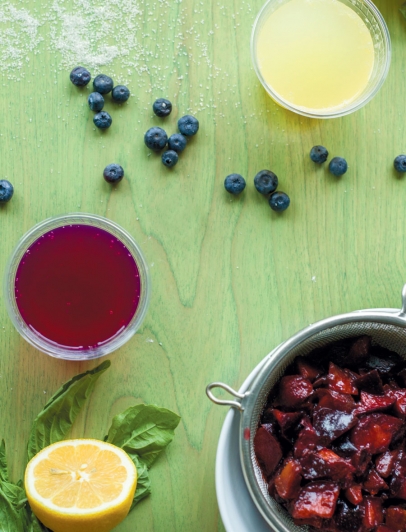Shrubs - A New Twist on an Old Tradition
How do you preserve the full essence of newly harvested fruits, herbs and vegetables and make them available, fresh tasting, and delicious year round? It’s an age-old, global conundrum.
While many of us freeze, can and ferment Alaska’s summer bounty, Helen Howarth of Fromagio’s Artisan Cheese in Anchorage is following another old tradition. She’s making shrubs - intriguing infusions of fruit (or sometimes vegetables), sugar, and vinegar. These infusions can be mixed with water, soda water, or, if you prefer, booze. Vinegar preserves the fresh fruit, nicely balances its natural sweetness, and adds a distinct twist that’s surprisingly thirst quenching.
A RICH GLOBAL TRADITION
Shrubs have a long and rich global history. An early English version dates back to the 15th century; itself borrowed from earlier Middle Eastern mixes that relied on citrus to supply acidity. Their name comes from the Arabic sharāb, meaning “to drink,” and sharbat, Persian aromatic syrups of fruit, herb and flower extracts, traditionally stirred with water and ice. The modern version has roots in the American Colonial era when people began using vinegar to preserve fresh fruit harvests. With the advent of home refrigeration shrubs eventually fell out of fashion. Until now.
THE SHRUB REVIVAL
Today, shrubs have re-emerged as both a natural alternative to soda and an über hip cocktail. You can find them on the menu at upscale urban bars and commercially produced and bottled in fun, offbeat flavors like Thai basil, Chinese celery, and turmeric.
Here in Alaska you can find Helen Howarth mixing and pouring shrubs at her Anchorage shop and at the Spenard Farmers’ Market on summer Saturdays. Howarth is a proud urban forager; she sources most of her ingredients from local gardens and backyards, or by simply gathering what’s in season and abundant at the farmers’ market.
“Making shrubs lets me use the full harvest of plentiful fruits like rhubarb and crab apples, as well as more rare produce like sweet, local plums, preserving that taste of summer so it’s accessible year round,” says Howarth. On a recent late winter afternoon I sampled her blue-barb shrub, made from wild Alaska blueberries and rhubarb from a friend’s garden. It was full of flavor with a pleasing and distinct tangy bite. “Shrubs are such a celebration of local flavors,” added Howarth, noticing how delighted I was by the taste.
And it’s not just about fruit. Howarth also makes delicious concoctions with Alaska grown carrots, beets, celery and herbs, adding ginger and other complementary flavors. This summer she’s keen to experiment with horseradish root. “Sweet or savory, both work equally well,” says Howarth.
But why shrubs at a cheese shop? “I wanted to offer something local given that Alaska cheeses aren’t readily available,” she explained. “Plus, there are commonalities: to make cheese we manage changes in ripening milk; to make shrubs we manage changes in ripening fruit and vegetables.”
HOW TO MAKE A SHRUB
“It’s easy,” says Howarth. “Simply chop your fruit or vegetables, place them in a large bowl with sugar and macerate, extracting the juices. Cover the bowl and refrigerate for a day or two, then pour off the juice and add any type of vinegar – experiment!” Store this mix in a corked bottle or closed jar indefinitely, mixing it with your libation of choice. Use the left over fruit or veggies in smoothies.
While Howarth urges taste to be your guide, the relative proportions are:
• About a pound of fruits or vegetables
• ¾ cup sugar
• ¾ cup vinegar
PIE, TOO?
Howarth explains one variation she uses for some fruits, especially rhubarb: she coats the fruit in sugar but doesn’t macerate. It may take a little longer, but the sugar will still draw out the juice. She then uses cheesecloth to squeeze out the juice and bakes the left over fruit in pies. “It’s a terrific way to use the whole harvest and make sure your rhubarb pie doesn’t get soggy.”




